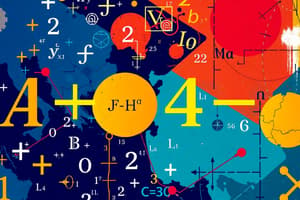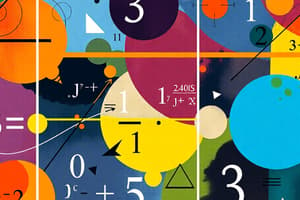Podcast
Questions and Answers
Which branch of mathematics primarily deals with the properties of numbers, especially integers?
Which branch of mathematics primarily deals with the properties of numbers, especially integers?
- Number Theory (correct)
- Statistics
- Calculus
- Geometry
What is the purpose of differential calculus in mathematics?
What is the purpose of differential calculus in mathematics?
- To study geometric shapes
- To deal with rates of change (correct)
- To calculate areas and volumes
- To analyze patterns in data
In statistics, what does the term 'median' refer to?
In statistics, what does the term 'median' refer to?
- The middle value when data is ordered (correct)
- The most frequently occurring value
- The average of a data set
- The difference between the highest and lowest values
Which of the following concepts is primarily studied in discrete mathematics?
Which of the following concepts is primarily studied in discrete mathematics?
What does a set represent in mathematics?
What does a set represent in mathematics?
What characterizes irrational numbers?
What characterizes irrational numbers?
What is the main focus of algebra in mathematics?
What is the main focus of algebra in mathematics?
Which mathematical tool is primarily used to prove geometric properties?
Which mathematical tool is primarily used to prove geometric properties?
What is the role of logic in mathematics?
What is the role of logic in mathematics?
What distinguishes complex numbers from real numbers?
What distinguishes complex numbers from real numbers?
Flashcards
Mathematics
Mathematics
The study of quantity, structure, space, and change using logic and abstract reasoning.
Arithmetic
Arithmetic
Basic math operations: addition, subtraction, multiplication, and division, including numbers like integers, fractions, decimals, and percentages.
Algebra
Algebra
Using variables and symbols to represent unknown quantities and solve equations and inequalities (linear, quadratic, etc.).
Geometry
Geometry
Signup and view all the flashcards
Calculus
Calculus
Signup and view all the flashcards
Statistics
Statistics
Signup and view all the flashcards
Sets
Sets
Signup and view all the flashcards
Real Numbers
Real Numbers
Signup and view all the flashcards
Complex Numbers
Complex Numbers
Signup and view all the flashcards
Discrete Mathematics
Discrete Mathematics
Signup and view all the flashcards
Study Notes
Fundamental Concepts
- Mathematics is the study of quantity, structure, space, and change.
- It uses logic and abstract reasoning to explore patterns, relationships, and problems.
- Key branches of mathematics include arithmetic, algebra, geometry, calculus, and statistics.
Arithmetic
- Deals with basic operations like addition, subtraction, multiplication, and division.
- Includes concepts like integers, fractions, decimals, and percentages.
- Provides the foundation for more advanced mathematical operations.
Algebra
- Uses variables and symbols to represent unknown quantities.
- Focuses on solving equations and inequalities.
- Includes concepts like linear equations, quadratic equations, and systems of equations.
Geometry
- Studies shapes, sizes, and spatial relationships.
- Covers topics like lines, angles, polygons, circles, and 3D figures.
- Utilizes theorems and postulates to prove geometric properties.
Calculus
- Deals with continuous change and motion.
- Includes differential calculus, which deals with rates of change, and integral calculus, which deals with areas and volumes.
- Fundamental tools for understanding physics and engineering.
Statistics
- Collects, analyzes, and interprets numerical data.
- Investigates patterns, trends, and relationships in data.
- Includes concepts like mean, median, mode, standard deviation, and probability.
Sets
- A set is a collection of distinct objects.
- Sets can be represented by listing their elements or using set notation.
- Fundamental concepts in many branches of mathematics.
Logic
- The study of correct reasoning and valid arguments.
- Includes statements, connectives, quantifiers, and logical implications.
- Formalizes reasoning processes and helps avoid fallacies.
Number Theory
- Focuses on the properties of numbers, particularly integers.
- Includes concepts like prime numbers, divisibility, and modular arithmetic.
- Important in cryptography and other applications.
Discrete Mathematics
- Studies objects that can be counted and are distinct.
- Includes concepts like combinatorics, graph theory, and logic.
- Foundational in computer science and other areas.
Real Numbers
- Include rational and irrational numbers.
- Rational numbers can be expressed as a fraction.
- Irrational numbers cannot be expressed as a fraction and have non-repeating, non-terminating decimals.
Complex Numbers
- Extend the real number system by including the imaginary unit "i", where i² = -1.
- Allow for solutions to equations that have no real solutions.
- Used extensively in engineering and physics.
Functions and Relations
- Describes how values in one set (input) are mapped to values in another set (output).
- Can be linear, quadratic, exponential, trigonometric or other types.
- Essential for modeling and analyzing relationships between variables.
Studying That Suits You
Use AI to generate personalized quizzes and flashcards to suit your learning preferences.
Description
Explore the essential branches of mathematics in this quiz, including arithmetic, algebra, geometry, and calculus. Test your understanding of fundamental concepts and their applications in solving various problems. Perfect for students seeking to strengthen their math skills.





